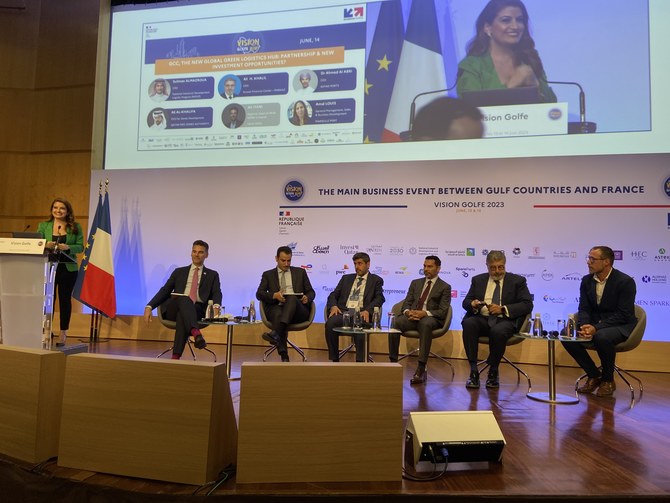PARIS: Highlighting the fast-growing logistics sector in Gulf countries, experts at an event lauded the region’s commitment to a futuristic and sustainable vision for the development of ports and supply chain systems.
They expressed these views at a roundtable discussion titled “New Global Hub for Green Logistics in the Gulf Countries: Partnership Opportunities and New Investments,” held in Paris on Wednesday at the Ministry of Economy, Finance and Industrial, and Digital Sovereignty. It was held as part of the Vision Golfe event and aimed to explore investment opportunities in the green logistics sector in the Gulf region, which is emerging as a new global hub.
Speakers at the panel — moderated by Ali Itani, Arab News region head of Japan and en Français — included top officials of institutions specialized in the logistics sector and financial institutions. They exchanged views on the evolution of the green logistics sector in GCC and its impact on the global economy.
Saudi Arabia, which is at the forefront of the ongoing regional transformation, has launched ambitious projects in the logistics sector and established strategic partnerships with key global players including France to achieve its goals.
“Our partnerships with France are strong and enduring. They can be considered as an example in the region,” said Suliman Al-Mazroua, CEO of the National Industrial Development and Logistics Program.
The top Saudi official said the strategy encourages all stakeholders to play their roles to help the Kingdom achieve its goals.
Al-Mazroua also highlighted Saudi Arabia’s most ambitious project, NEOM. Sustainability is at the heart of the $500 billion smart city.
The official said the concept of sustainability forms the basis for all development projects announced as part of the Kingdom’s Vision 2030 program.
“We have (also) shared with the world our strategy on an energy mix based on renewables,” he said.
Al-Mazroua said the Kingdom is investing in research and development to ensure sustainability in all spheres of life. The official also highlighted Saudi Arabia’s efforts to help the world mitigate the effects of climate change and transition toward cleaner fuels.
Ahmed Al-Abri, CEO of Asyad Ports, underscored the importance of sustainable development and reducing carbon footprint.
“Asyad Ports was established in 2016 to make Oman an important logistics hub in the region,” he said.
“These facilities provide comprehensive logistics services. They offer all means of transportation to ensure supply, which is an essential activity for economic growth and sustainable development with the goal of zero emissions.”
Responding to a question by Itani, Al-Abri said that sustainability mechanisms have been integrated into all regional projects being carried out in partnership with foreign partners.
“Partner companies that want to invest or establish partnerships with local companies in the logistics sector are assured of the implementation of sustainability mechanisms and the means to achieve them. Our vision is to build modern, accessible, and sustainable infrastructure and logistics capabilities,” he said.















